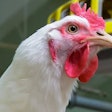Clear signals are received when H5N1 gets out of hand. Governments go to great lengths to assuage people at home and abroad then a team of experts arrives. Kuwait made no secret of the rash of recent outbreaks in poultry and birds of prey but repeated time and again all absence of human infection. The first outbreaks in poultry and falcons were confirmed in late February and an OIE (World Organisation of Animal Health) team of experts arrived on 6 March.
Main concern over H5N1 in Kuwait is the large number of outbreaks in a short space time within such a small land area and wide range of birds. Kuwait occupies less than 18,000km2 with a population of less than 3 million (2 million expatriate workers). By 12 March, authorities had identified 53 cases including chickens, quail and falcons. Falconry is an important lifestyle and hobby in Kuwait. Areas up and down the country have recorded outbreaks including Al-Abdali and Al-Wafrah in the extreme north and far south, respectively, and Al-Sulaibiya and Al Jahra in central Kuwait.
Over 25,000 birds have been slaughtered since outbreaks began on 25 February. A programme of fumigation is underway on poultry farms across the country. Kuwait Zoo, which recorded some of the first cases, was shut down and slaughter and selling of all live poultry in residential areas banned for 3 months.
Over 300 handlers of poultry and falcons tested for disease have all proved negative. Infections found in falcons are especially worrying given the high mobility of these birds of prey. Hawk hunters have been asked to stay out the field to avoid contact with migratory birds that may be carrying the virus. Kuwait has a history of H5N1 infecting ‘strange’ birds. The only previous case was an infected flamingo in 2005.
Well known chicken restaurants such as Texas Chicken Restaurants and Naif Restaurants said it was too early to tell whether outbreaks had affected residents’ appetite for poultrymeat.
Alarmed by events in Kuwait, the United Arab Emirates has banned all live poultry imports as a precautionary measure.



















